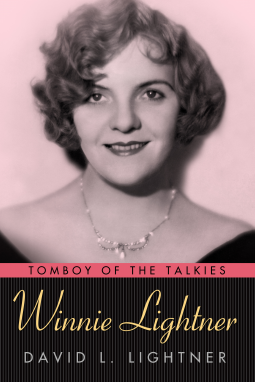
Winnie Lightner
Tomboy of the Talkies
by David L. Lightner
This title was previously available on NetGalley and is now archived.
Send NetGalley books directly to your Kindle or Kindle app
1
To read on a Kindle or Kindle app, please add kindle@netgalley.com as an approved email address to receive files in your Amazon account. Click here for step-by-step instructions.
2
Also find your Kindle email address within your Amazon account, and enter it here.
Pub Date Dec 06 2016 | Archive Date Jun 23 2017
University Press of Mississippi | Hollywood Legends Series
Description
THE BIOGRAPHY OF THE SPUNKY "SONG A MINUTE GIRL," THE FIRST ACTRESS TO HAVE HER SPOKEN WORDS CENSORED
Winnie Lightner (1899- 1971) stood out as the first great female comedian of the talkies. Blessed with a superb singing voice and a gift for making wisecracks and rubber faces, she rose to stardom in vaudeville and on Broadway. Then, at the dawn of the sound era, she became the first person in motion picture history to have her spoken words, the lyrics to a song, censored. In Winnie Lightner: Tomboy of the Talkies, David L. Lightner shows how Winnie Lightner's hilarious performance in the 1929 musical comedy Gold Diggers of Broadway made her an overnight sensation. She went on to star in seven other Warner Bros. features. In the best of them, she was the comic epitome of a strident feminist, dominating men and gleefully spurning conventional gender norms and moral values. So tough was she, the studio billed her as "the tomboy of the talkies."
When the Great Depression rendered moviegoers hostile toward feminism, Warner Bros. tried to craft a new image of her as glamorous and sexy. Executives assigned her contradictory roles in which she was empowered in the workplace but submissive to her male partner at home. The new persona flopped at the box office, and Lightner's stardom ended. In four final movies, she played supporting roles as the loudmouthed roommate and best friend of actresses Loretta Young, Joan Crawford, and Mona Barrie.
Following her retirement in 1934, Lightner faded into obscurity. Many of her films were damaged or even lost entirely. At long last, this biography gives Winnie Lightner the recognition she deserves as a notable figure in film history, in women's history, and in the history of show business.
DAVID L. LIGHTNER, Edmonton, Alberta, Canada, is professor emeritus of history at the University of Alberta. He is the author of Slavery and the Commerce Power: How the Struggle against the Interstate Slave Trade Led to the Civil War; Asylum, Prison, and Poorhouse: The Writings and Reform Work of Dorothea Dix in Illinois; and Labor on the Illinois Central Railroad, 1852-1900: The Evolution of an Industrial Environment. He became interested in Winnie Lightner because of their shared surname but is not related to her.
Available Editions
| EDITION | Hardcover |
| ISBN | 9781496809834 |
| PRICE | $35.00 (USD) |



